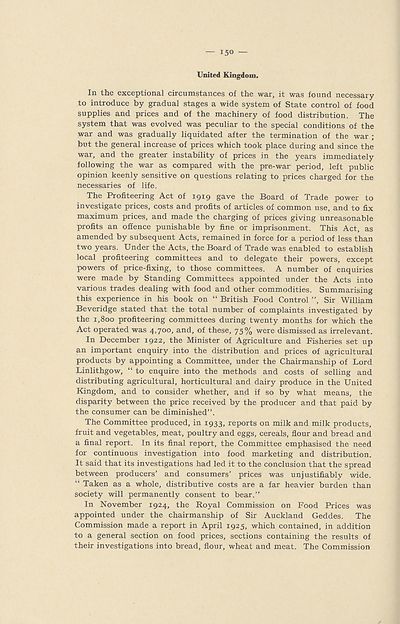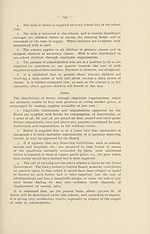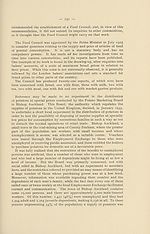Download files
Complete book:
Individual page:
Thumbnail gallery: Grid view | List view

150 —
United Kingdom.
In the exceptional circumstances of the war, it was found necessary
to introduce by gradual stages a wide system of State control of food
supplies and prices and of the machinery of food distribution. The
system that was evolved was peculiar to the special conditions of the
war and was gradually liquidated after the termination of the war ;
but the general increase of prices which took place during and since the
war, and the greater instability of prices in the years immediately
following the war as compared with the pre-war period, left public
opinion keenly sensitive on questions relating to prices charged for the
necessaries of life.
The Profiteering Act of 1919 gave the Board of Trade power to
investigate prices, costs and profits of articles of common use, and to fix
maximum prices, and made the charging of prices giving unreasonable
profits an offence punishable by fine or imprisonment. This Act, as
amended by subsequent Acts, remained in force for a period of less than
two years. Under the Acts, the Board of Trade was enabled to establish
local profiteering committees and to delegate their powers, except
powers of price-fixing, to those committees. A number of enquiries
were made by Standing Committees appointed under the Acts into
various trades dealing with food and other commodities. Summarising
this experience in his book on “ British Food Control ”, Sir William
Beveridge stated that the total number of complaints investigated by
the 1,800 profiteering committees during twenty months for which the
Act operated was 4,700, and, of these, 75% were dismissed as irrelevant.
In December 1922, the Minister of Agriculture and Fisheries set up
an important enquiry into the distribution and prices of agricultural
products by appointing a Committee, under the Chairmanship of Lord
Linlithgow, “ to enquire into the methods and costs of selling and
distributing agricultural, horticultural and dairy produce in the United
Kingdom, and to consider whether, and if so by what means, the
disparity between the price received by the producer and that paid by
the consumer can be diminished”.
The Committee produced, in 1933, reports on milk and milk products,
fruit and vegetables, meat, poultry and eggs, cereals, flour and bread and
a final report. In its final report, the Committee emphasised the need
for continuous investigation into food marketing and distribution.
It said that its investigations had led it to the conclusion that the spread
between producers’ and consumers’ prices was unjustifiably wide.
“ Taken as a whole, distributive costs are a far heavier burden than
society will permanently consent to bear.”
In November 1924, the Royal Commission on Food Prices was
appointed under the chairmanship of Sir Auckland Geddes. The
Commission made a report in April 1925, which contained, in addition
to a general section on food prices, sections containing the results of
their investigations into bread, flour, wheat and meat. The Commission
United Kingdom.
In the exceptional circumstances of the war, it was found necessary
to introduce by gradual stages a wide system of State control of food
supplies and prices and of the machinery of food distribution. The
system that was evolved was peculiar to the special conditions of the
war and was gradually liquidated after the termination of the war ;
but the general increase of prices which took place during and since the
war, and the greater instability of prices in the years immediately
following the war as compared with the pre-war period, left public
opinion keenly sensitive on questions relating to prices charged for the
necessaries of life.
The Profiteering Act of 1919 gave the Board of Trade power to
investigate prices, costs and profits of articles of common use, and to fix
maximum prices, and made the charging of prices giving unreasonable
profits an offence punishable by fine or imprisonment. This Act, as
amended by subsequent Acts, remained in force for a period of less than
two years. Under the Acts, the Board of Trade was enabled to establish
local profiteering committees and to delegate their powers, except
powers of price-fixing, to those committees. A number of enquiries
were made by Standing Committees appointed under the Acts into
various trades dealing with food and other commodities. Summarising
this experience in his book on “ British Food Control ”, Sir William
Beveridge stated that the total number of complaints investigated by
the 1,800 profiteering committees during twenty months for which the
Act operated was 4,700, and, of these, 75% were dismissed as irrelevant.
In December 1922, the Minister of Agriculture and Fisheries set up
an important enquiry into the distribution and prices of agricultural
products by appointing a Committee, under the Chairmanship of Lord
Linlithgow, “ to enquire into the methods and costs of selling and
distributing agricultural, horticultural and dairy produce in the United
Kingdom, and to consider whether, and if so by what means, the
disparity between the price received by the producer and that paid by
the consumer can be diminished”.
The Committee produced, in 1933, reports on milk and milk products,
fruit and vegetables, meat, poultry and eggs, cereals, flour and bread and
a final report. In its final report, the Committee emphasised the need
for continuous investigation into food marketing and distribution.
It said that its investigations had led it to the conclusion that the spread
between producers’ and consumers’ prices was unjustifiably wide.
“ Taken as a whole, distributive costs are a far heavier burden than
society will permanently consent to bear.”
In November 1924, the Royal Commission on Food Prices was
appointed under the chairmanship of Sir Auckland Geddes. The
Commission made a report in April 1925, which contained, in addition
to a general section on food prices, sections containing the results of
their investigations into bread, flour, wheat and meat. The Commission
Set display mode to:
![]() Universal Viewer |
Universal Viewer | ![]() Mirador |
Large image | Transcription
Mirador |
Large image | Transcription
Images and transcriptions on this page, including medium image downloads, may be used under the Creative Commons Attribution 4.0 International Licence unless otherwise stated. ![]()
| League of Nations > Economic and financial section > Problem of nutrition > (152) |
|---|
| Permanent URL | https://digital.nls.uk/190925738 |
|---|
| Shelfmark | LN.II |
|---|
| Description | Over 1,200 documents from the non-political organs of the League of Nations that dealt with health, disarmament, economic and financial matters for the duration of the League (1919-1945). Also online are statistical bulletins, essential facts, and an overview of the League by the first Secretary General, Sir Eric Drummond. These items are part of the Official Publications collection at the National Library of Scotland. |
|---|---|
| Additional NLS resources: |
|

